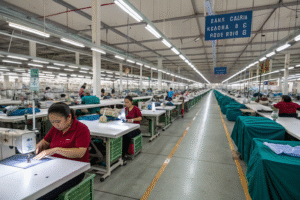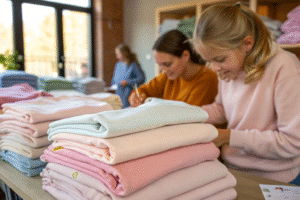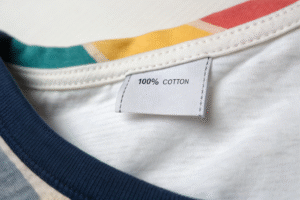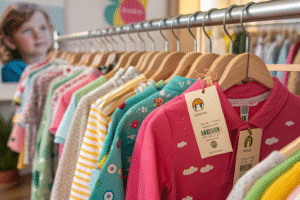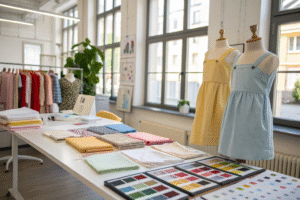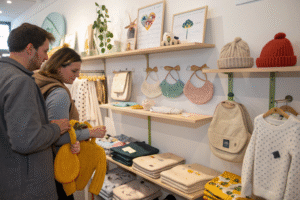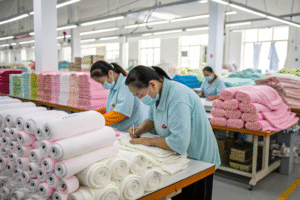Selling kids’ clothing online is rewarding—but to truly succeed, you’ll need more than cute products. You need strategy, smart sourcing, and a clear plan to attract and retain customers.
To launch a successful online children’s clothing store, start with a profitable niche, use the right e-commerce platform, source reliable suppliers, and build targeted marketing strategies.
This article walks you through each step, helping you create a profitable kidswear business that parents love to buy from.
How to Choose a Profitable Niche in Kidswear?
Not every kidswear category is equally profitable. Success often means focusing on an underserved or highly desired area within the children’s apparel market.
Choose a profitable kidswear niche by identifying unique needs, trending styles, or underserved segments like eco-friendly fabrics, gender-neutral styles, or special-occasion wear.

Which niches are profitable in children’s clothing?
Here’s a breakdown of popular niches:
| Profitable Niche | Example Products | Why It’s Successful |
|---|---|---|
| Organic/Eco-Friendly | Bamboo pajamas, organic rompers | Parents prefer safe, chemical-free options |
| Gender-Neutral Clothing | Unisex bodysuits, basics | Appeals broadly, simplifies inventory |
| Adaptive Clothing | Sensory-friendly clothes | Underserved market, loyal customer base |
| Custom or Personalized | Monogrammed onesies, name embroidery | High perceived value, strong gifting |
| Ethnic/Cultural Wear | Traditional dresses, cultural prints | Serves community-driven demand |
How do you evaluate if a niche is profitable?
- Check competition levels on Google searches or Amazon
- Look at social media trends and influencer interest
- Verify average selling prices and customer reviews
- Use tools like Google Trends to gauge interest growth
The best niches balance clear market demand with moderate competition, allowing your store to stand out quickly.
Best E-Commerce Platforms for Selling Children’s Clothes?
The right platform simplifies your sales and marketing, makes your store look professional, and grows with you as orders increase.
Top e-commerce platforms for kidswear stores include Shopify, WooCommerce, Wix, and marketplaces like Etsy—each offering unique features depending on your business model.

Which e-commerce platforms work best for children’s clothing?
| Platform | Best For | Pros/Cons |
|---|---|---|
| Shopify | Branded stores, scalability | Professional, easy setup, many plugins |
| WooCommerce | Highly customizable, budget-conscious | Affordable but requires tech setup |
| Etsy | Handmade, custom babywear | Built-in audience, but competition |
| Wix E-commerce | Beginners, easy drag-and-drop | User-friendly, less customization |
| Amazon Handmade | High-volume, fast growth | Large market, lower margins |
We recommend Shopify for most kidswear startups because it’s user-friendly, has extensive features, and supports growth easily.
What factors should guide your platform choice?
- Budget and initial setup costs
- Level of technical skill
- Need for customization vs simplicity
- Scalability and growth goals
Start with Shopify’s basic plan or Etsy’s marketplace if you’re unsure—both have low initial costs and offer quick launch capability.
How to Find Reliable Kidswear Suppliers and Manufacturers?
Reliable suppliers keep your store stocked with high-quality products, consistent sizing, and timely deliveries—essential for happy customers.
Find reliable kidswear suppliers by attending trade shows, exploring online B2B platforms, or getting referrals from other clothing entrepreneurs.

Where to find trustworthy kidswear suppliers?
| Source | How It Helps |
|---|---|
| Trade Shows (MAGIC, CBME) | Meet vetted suppliers, see samples firsthand |
| Online Directories (Alibaba, Maker’s Row) | Read reviews, compare prices, MOQs |
| LinkedIn & Facebook Groups | Recommendations, verified profiles |
| Industry Referrals | Proven reliability, reduced risk |
Always request samples and check certifications (OEKO-TEX®, CPSIA compliance) to verify safety and quality.
What questions to ask potential suppliers?
- “Can you provide certifications (OEKO-TEX®, CPSIA)?”
- “What is your MOQ (minimum order quantity)?”
- “Can you offer private-label packaging?”
- “What’s your standard production lead time?”
At Fumao, we often assist new brands by clearly answering these questions upfront and providing transparent pricing, sampling, and shipping.
Tips for Driving Traffic and Sales to Your Online Store?
Even the most beautiful store won’t make sales unless you actively drive visitors—and convert them into buyers.
Drive traffic and sales by optimizing your website for SEO, creating engaging social media content, leveraging influencer partnerships, and using targeted email marketing.

What marketing tactics work best for kidswear?
| Marketing Method | How It Drives Sales |
|---|---|
| Instagram & TikTok Content | Visual storytelling, direct shopping |
| Influencer Partnerships | Trusted recommendations boost conversions |
| SEO-Optimized Blogs | Organic traffic from parents’ Google searches |
| Email Marketing | Retention, repeat buying, seasonal promotions |
| Pinterest Pins | Baby shower ideas, gift planning audience |
Parents research, browse, and buy online constantly—your goal is to show up consistently with engaging, trust-building content.
How to start marketing affordably?
- Create consistent, high-quality social posts (babywear photos, customer images)
- Collaborate with micro-influencers (offer free products, discount codes)
- Set up simple email campaigns (welcome email, monthly offers)
- Write helpful blog posts for common parent searches (e.g., "softest fabric for newborns")
One Fumao client started with Instagram posts and influencer outreach—now selling thousands of units monthly from organic social traffic alone.
Conclusion
Starting a successful online children’s clothing store involves strategic niche selection, reliable sourcing, a robust platform, and focused marketing. Follow these practical steps, and you’ll be well on your way to a thriving kidswear business.


